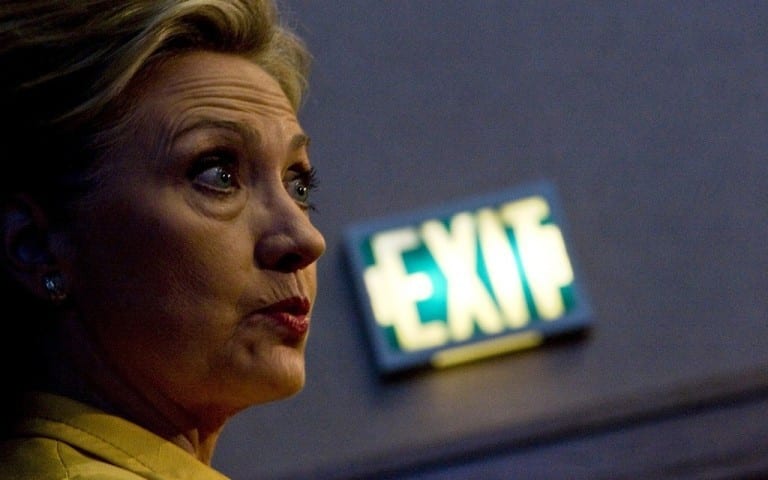

Judicial Watch Releases New Document in Criminal Corruption Case against Hillary Clinton in Whitewater Affair


Highly Detailed ‘Order of Proof’ Names Over 100 Witnesses, Outlines Evidence To Be Used At Trial
(Washington, DC) – Judicial Watch today released an unprecedented accounting of the evidence that would have been used at a criminal trial against Hillary Clinton in the Whitewater case. The April 1998 memo by the Office of Independent Counsel, titled “HRC Order of Proof,” includes the names of 121 witnesses, discussions of evidence, and aspects of grand jury testimony to be used at trial, forming a virtual road map to the sweeping criminal case against the Whitewater conspirators.
Prosecutors ultimately decided not to indict Mrs. Clinton, calculating that they could not win the complicated, largely circumstantial case against such a high-profile figure. But while the general outline of the case is known, the “Order of Proof” is definitive and highly detailed, nailing down a number of disputed issues. Among them:
- The cover-up of Clinton financial misdeeds in Arkansas began in earnest on a specific date: March 7, 1992.
- Documents from the Rose Law Firm—Mrs. Clinton’s former employer at the center of the growing scandal—were passed to a campaign aide in the firm’s “parking lot that night,” demonstrating that Mrs. Clinton and her Rose Law Firm Partners—Webster Hubbell and Vincent Foster—were early participants in the cover-up.
- There was a furious Clinton effort to locate documents and shut down witnesses.
- Media coverage of the Clintons led to renewed interest by the Resolution Trust Corp. in the corrupt bank at the center of the story, Madison Guaranty Savings & Loan. Madison was “already on the list of S&Ls to be revisited,” having been the subject of earlier probes and a prior criminal case.
- Tulsa-based senior Resolution Trust Corp. investigator Jean Lewis—later the subject of a vituperative campaign of personal destruction by the Clinton side—was dispatched “by her local supervisor and someone in Washington to go to Little Rock to determine if Whitewater had caused [Madison] a loss.”
- Lewis visited Little Rock in April 1992, and drew up Criminal Referral C-0004, which was sent “directly to the Little Rock U.S. Attorney and Little Rock FBI on 9/1/92.”
- U.S. Attorney Paula Casey—a Clinton associate—and the Little Rock FBI office agreed to hold the criminal referral “in abeyance until after the election.” Meanwhile, the FBI and RTC investigations moved forward. Nine more RTC criminal referrals involving Madison-related schemes were drawn up.
- A Justice Department probe was underway on July 20, 1993, when search warrants were obtained in Little Rock for Whitewater-related investigations. That night in Washington, Vincent Foster, the former Rose Law Firm partner serving as both the Clintons’ personal lawyer and White House deputy counsel, committed suicide.
- Two senior Justice Department officials—David Margolis and Philip Heymann—are on the “Order of Proof” witness list. In the immediate aftermath of Foster’s death, Margolis and Heymann received White House Counsel Bernard Nussbaum’s consent to search Foster’s office. Then Nussbaum “reneged.”
- Heymann—the Deputy Attorney General of the United States—was “[v]ery upset over the matter” and “[a]sked Bernie what he was trying to hide.”
- Numerous witnesses would testify they saw documents being removed from Foster’s office, including papers that resembled the Rose Law Firm billing records—under subpoena at that time and nowhere to be found.
Judicial Watch Chief Investigative Reporter Micah Morrison reported on the new document today at the Daily Caller.
“This is an important and timely document,” said Judicial Watch President Tom Fitton. “It shows that there was significant evidence against Mrs. Clinton in Whitewater. The parallels with the email scandal—the stonewalling of document production, the ‘missing’ documents, the lies and evasions—are striking.”
In January, Judicial Watch released 246 pages of previously undisclosed Office of Independent Counsel (OIC) internal memos on criminal charges against Hillary Clinton in the Whitewater investigation.
On February 9, Morrison provided more details on the case, based on a newly obtained confidential document. The document included a description of the case against Mrs. Clinton “in the legal terms of an indictment.”
“This detailed memo adds considerably to our understanding of Mrs. Clinton’s unethical—and likely criminal—past,” said Fitton. “The material uncovered by Judicial Watch in recent months strongly suggests that if she weren’t First Lady at the time, she would have been successfully prosecuted in federal court. We have proved that an actual draft indictment of Mrs. Clinton is being held by the National Archives, a document they refuse to turn over in response to our Freedom of Information Act requests. But we are not taking ‘no way’ for an answer. We have asked the courts to compel the National Archives to turn over the document. Stay tuned.”
###















